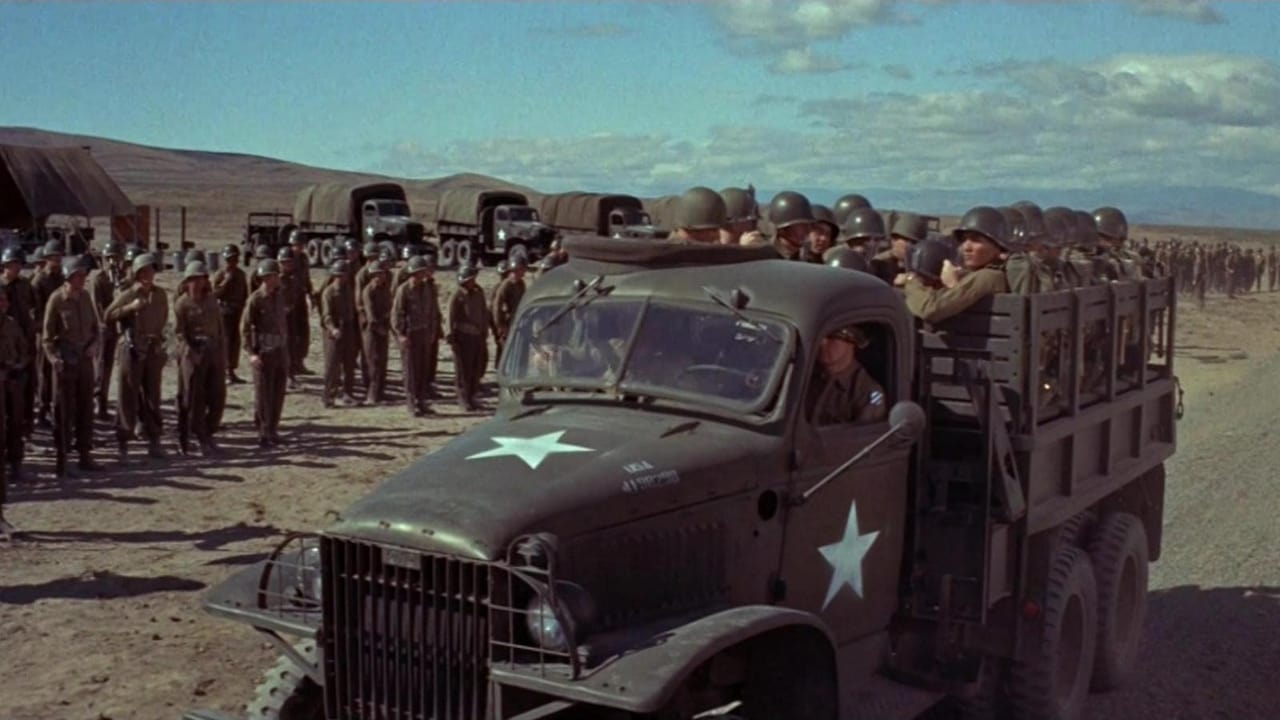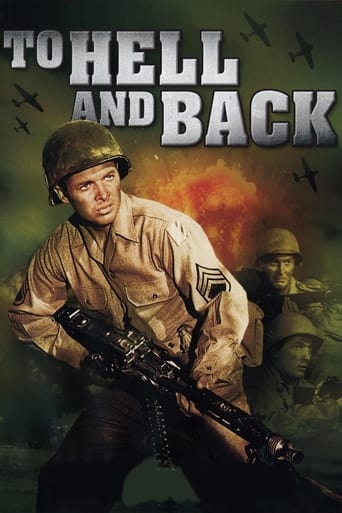

Sorry, this movie sucks
... View MoreBetter Late Then Never
... View MoreThis is a must-see and one of the best documentaries - and films - of this year.
... View MoreThe movie runs out of plot and jokes well before the end of a two-hour running time, long for a light comedy.
... View MoreAudie Murphy was never much of an actor. The only movie he starred in that is worth watching is "To Hell and Back," in which he does a decent job of acting, though one suspects that other actors could have done much better. And yet, the movie just would not have been the same without him.In the book on which this movie was based, Murphy referred to his "thin frame and cursed baby face," which made his commanding officer want to keep him away from the front, giving him light duty, but Murphy kept sneaking off with patrols and scouting parties. Eventually, the company commander gave up and put Murphy back in the front lines. Because our idea of a hero is someone who looks like Rambo, Murphy would never have been cast in this part had the movie been fictional. Even knowing that the movie was based on a true story, the audience might still have been incredulous had a little man with a baby face other than Murphy played the part. Imagine Elisha Cook, Jr. in that role. But by having Murphy play the part himself, we are forced to accept the fact that the kind of actor who plays the hero in a typical movie and the kind of man who is a real hero can be two very different things. And when we reflect on the fact that Murphy was thirty years old when he made the movie, we realize he must have really looked like a baby when he enlisted at the age of seventeen.We all know that movies often diverge from the books they are based on, and so we usually just assess the movie on its own terms. There is one event described in the book, however, that is worth calling attention to, especially since almost no one has read it. Early in the war, when Murphy's company is in Sicily, they come across a couple of Italian officers. Murphy describes the magnificent white horses the Italians mount and on which they ride away. Murphy raises his rifle, fires twice, killing them both. The lieutenant is appalled. He asks Murphy why he did that, saying he should not have shot them. Murphy argues back, telling the lieutenant that that killing the enemy is "our job." Murphy notes that new men are trained to talk tough and act tough, but it takes a while before they accept the fact that they are supposed to "deal out death," and that the lieutenant had not yet accepted that fact.The Italian officers were the first two men Murphy killed, and it is the most unforgettable passage in the book, but there is no mystery why it never made its way into the movie. Generally speaking, we do not like to see our heroes shoot retreating men in the back in cold blood. In most war movies, bullets are flying back and forth, and so it is kill or be killed. But Murphy's life was not in danger when he pulled the trigger. Better still, we like it when something happens that makes the war personal. Later in the movie, in the scene where Murphy charges up a hill and singlehandedly takes out two machine gun nests, what precipitates his heroism is the death of his friend, which makes him angry. But Murphy was not angry when he killed the Italian officers.There is another reason why that event never made it into the movie. There is an unwritten law that in any movie set during World War II, under no circumstances will an American soldier be seen killing Italians, just as there must be no scene of Italian soldiers killing Americans. Granted, the early surrender of the Italians made the occasion for killing or being killed by Italians infrequent, but not so infrequent that the occasion did not occur in Murphy's case. The Italians did not sneak attack us at Pearl Harbor, and the Italians did not run camps like Auschwitz. They were a pipsqueak nation that never had much of a chance to do anything to us, and so we suppress combat scenes between American and Italian soldiers.Along these lines, in the typical combat movie made during World War II, there is the obligatory ethnic diversity: an Anglo-Saxon officer, a Mexican, a Pole, an Irishman, an American Indian, and always an Italian. We never see German-Americans or Japanese-Americans as part of the mix. Though a lot of Japanese-Americans were sent to concentration camps, euphemistically referred to as relocation centers, some still did serve in the American armed forces. But we don't see them so much in the movies (though reference is made to one having done so in "Bad Day at Black Rock" (1955)). But no combat movie is complete without an Italian as part of the company, America's way of saying that the Italians were really not evil, they just got tricked by Mussolini.Even if there is a remake of this movie, I doubt that Murphy's killing the Italian officers would be depicted in it either. In fact, such a remake would undoubtedly have a scene showing Murphy suffering from PTSD after the war was over (regardless of whether that was true or not). In the 1950s, we were perfectly comfortable with the idea that soldiers fought World War II with a clean conscience. Today, that might disturb us, especially after seeing him kill in cold blood.
... View MoreProbably unique amongst the plethora of World War 2 films in that not only is it a true story but actually acted out by the man who was there. If this was fiction you'd think it was cheesy and unbelievable, knowing it is fact and having read his autobiography makes it all the more remarkable. This must be one of the few films which actually tones down some of the hero's actions because they're just so unbelievable. It isn't perfect by any means, it's clearly all shot in army training grounds in the US. The tanks are all wrong and some of the special effects pretty weak but you have to forgive that for the time and the budget. Having read Murphy's book the film very much sanitises many of the events, no lines of GI's queueing up at Sicilian brothels, no three wounded German soldiers left to die slowly in a quarry because there's nothing they can do to help them. No drunken officer ordering Murphy to make an ill-advised patrol which he ignores or platoon Sergeant becoming unglued in the face of a horrendous bombardment and suffering a breakdown in front of his men. In the movie Murphy's first combat is destroying a machine-gun post, an event which does happen but actually much later. In real life it's when a soldier in his platoon is killed by a random shell whilst marching to the front and his first kills are a pair of Italian officers shot in the back whilst they attempt to flee. One story I've heard is that General Eisenhower liked the film but disapproved of the choice of leading man saying he was too small for the role, unaware that actually Murphy was playing himself although that may be a myth.
... View More*Spoiler/plot- To Hell and Back, 1955. The most decorated soldier in WW2 Audie Murphy portrays himself in this battle Saga of the Third Infantry Division. A true story of the famed Texas youth and the heroic stories of his squad's members battles in Sicily, Italy and France.*Special Stars- Audie Murphy, Marshal Thompson, Jack Kelly, Paul Picerni, Denver Pyle, David Janssen, John McIntire: Narrator, Gen. Walter Bedell Smith.*Theme- Good American values work every time.*Trivia/location/goofs- Mr. Muphy was awarded his medals at the age of 19 and entered the US service at 16 years old. Mr. Murphy did NOT wish to play himself because he thought the public would think bad of him and wanted Universal Studios newcomer, Tony Curtis to play the role. Mr. Murphy was often compared to WW1 reluctant hero, Sgt. Alvin York. German tanks are actually newer Patton I US tanks of the Korean war era. Germans' wear WW1 helmets with the temple lugs in this film.*Emotion- If you try to compare this WW2 film to todays digital films, it won't satisfy you. However if you compare this war film with others of special note like 'Battleground' and 'A walk in the Sun'; this film is very interesting and well worth your attention. The fact that it is starring the very person who really lived this war time experience, this film is a special gem. I would rather see the real hero play himself than be dissatisfied with a pale substitute lead actor in such an important role. I think Tony Curtis would have not done the important role well. This film is a classic and a history lesson about a true American hero that suffered the rest of his life for his bravery to serve this country.
... View MoreIt is difficult to imagine how a grade school teenager performed so brilliantly and courageously in World War 2 given the circumstances that he was part of all the major theaters of operation in Europe. He was and will always be remembered as a hero.Perhaps my viewpoint is tinted because of all the superior docudramas that have unfolded in Hollywood over the past 15 years. This was a 50s war movie and Hollywood didn't really capture realism even with Audie in the lead role.Knowing it is a true account of Murphy's unbelievable heroics, the director wandered through the film with with a typical script of the time that didn't give Mr Murphy the proper credit he so rightly deserved. The so-called Italian girl scene didn't help the movie.Realism was absent during critical scenes and the uniforms (so clean) did not help its' believability. God love Audie and God bless him and it is too bad, considering the subject, that that Hollywood didn't spend enough time making the story much greater than it was depicted.
... View More